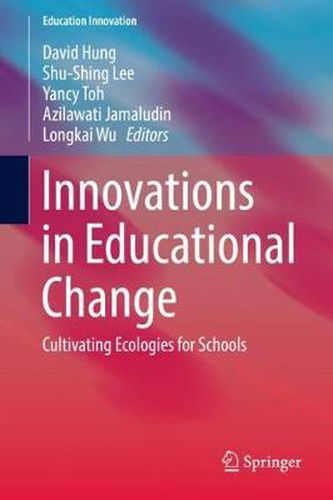Readings Newsletter
Become a Readings Member to make your shopping experience even easier.
Sign in or sign up for free!
You’re not far away from qualifying for FREE standard shipping within Australia
You’ve qualified for FREE standard shipping within Australia
The cart is loading…






This title is printed to order. This book may have been self-published. If so, we cannot guarantee the quality of the content. In the main most books will have gone through the editing process however some may not. We therefore suggest that you be aware of this before ordering this book. If in doubt check either the author or publisher’s details as we are unable to accept any returns unless they are faulty. Please contact us if you have any questions.
This book offers an ecological perspective to understand the opportunities and complexities of spreading and sustaining educational innovations. It explores the imperatives underpinning educational reforms and identifies the role of schools in developing, disseminating, and sustaining changes in Singapore’s educational context. It also includes international case studies that examine the dialectical relationships between structure, people and culture and demonstrate that cultivating ecologies involves leveraging affordances and resources across the education system to create new contexts, synergies and capacities. Further, it argues that educational innovations and reforms also need to consider tacit knowledge and conditions of transfer, which may be ambiguous and challenging. Few books address the nuances and interactions of innovation and change across levels of the education ecology - from the micro (classroom), meso (organisation / school), exo (partners), macro (policy) and chrono (time scales) levels. The ecological perspective adopted in this book explores the dynamic tensions in order to understand the interplays of policy and school-level influences that contextualize school innovations. By presenting multiple voices and views, it allows impediments and affordances of innovation diffusion to be discussed holistically, which is an integral caveat for nurturing a sustainable ecology that enables innovations.
$9.00 standard shipping within Australia
FREE standard shipping within Australia for orders over $100.00
Express & International shipping calculated at checkout
Stock availability can be subject to change without notice. We recommend calling the shop or contacting our online team to check availability of low stock items. Please see our Shopping Online page for more details.
This title is printed to order. This book may have been self-published. If so, we cannot guarantee the quality of the content. In the main most books will have gone through the editing process however some may not. We therefore suggest that you be aware of this before ordering this book. If in doubt check either the author or publisher’s details as we are unable to accept any returns unless they are faulty. Please contact us if you have any questions.
This book offers an ecological perspective to understand the opportunities and complexities of spreading and sustaining educational innovations. It explores the imperatives underpinning educational reforms and identifies the role of schools in developing, disseminating, and sustaining changes in Singapore’s educational context. It also includes international case studies that examine the dialectical relationships between structure, people and culture and demonstrate that cultivating ecologies involves leveraging affordances and resources across the education system to create new contexts, synergies and capacities. Further, it argues that educational innovations and reforms also need to consider tacit knowledge and conditions of transfer, which may be ambiguous and challenging. Few books address the nuances and interactions of innovation and change across levels of the education ecology - from the micro (classroom), meso (organisation / school), exo (partners), macro (policy) and chrono (time scales) levels. The ecological perspective adopted in this book explores the dynamic tensions in order to understand the interplays of policy and school-level influences that contextualize school innovations. By presenting multiple voices and views, it allows impediments and affordances of innovation diffusion to be discussed holistically, which is an integral caveat for nurturing a sustainable ecology that enables innovations.